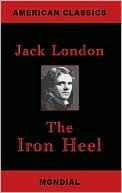

 |

|

The average rating for The Iron Heel based on 2 reviews is 4 stars.
Review # 1 was written on 2012-07-25 00:00:00 Aron Siegel Aron SiegelThe Iron Heel by Jack London is Upton Sinclair meets Wolf Larson. Described by many as the first of the modern dystopian novels, this one takes a strongly socialist stance, clearly espousing this ideology in lengthy diatribes. While reading this work I frequently compared to Ayn Rand's Atlas Shrugged, but in contrast. Both novels ambitiously seek a prophetic tone, but both ultimately wind up as monological propaganda with straw man arguments propped up in opposition. The Iron Heel does have the good taste to not run over 1,000 pages. Another of London's works, the short story The Mexican espouses London's feelings as well, deeply sympathetic to socialist causes and centers around romantic heroism of its champions. One aspect of the Iron Heel that was amazing, and truly prophetic was London's uncanny ability to forecast power plays of government, especially the rise of Hitler's Germany, some thirty years after the release of The Iron Heel. Social and political critics of modern day capitalism could also look to this 1908 publication to show how the rich get richer and labor unions have been bought out and find themselves underpowered to react. |
Review # 2 was written on 2015-05-15 00:00:00 Joel Rude Joel Rudeto-read-before-it-gets-banned This is an important book. It's so important that the editors of the German Wiktionary site decided to use a quote from the book for the entry IMPORTANT. I think I never used the phrase must read for a book in any one of my reviews. And I'm still not doing it here. But I'd answer YES! if you ask "Should I read this book?" Those of you who read other works by Jack London and think that this is some adventure story set in Alaska or on a ship at sea or something? Forget it. It's a Dystopian of pure breed: The everlasting struggle between good and evil. The good guys here are the ordinary people, i.e. us, and the evil one is the caste of oligarchs running the country along with their puppet show of politicians and the judicial branch, working in their favor. Avis Cunningham gets to know young Ernest Everhard in her father's house in 1912. Everhard is an educated member of the working class, a genuine socialist, and impresses the young woman with his knowledge of the conditions of inequality in their country. The two fall in love and eventually marry. Their battle is henceforth the class enemy, the oligarchs upper class, called the Iron Heel by Everhard. At the beginning of the 1930s it comes to the inevitable bloody revolt against the oppressors. The revolt fails. Everhard, like thousands of others, is executed. The fight, however, continues. The events of the turbulent period from 1912 until the Revolution in 1932 is written down by Avis Everhard in the so-called Everhard Manuscript and is the content of this novel. You might say that I spoiled the ending, however, all this information is readily available in the foreword, which is an important part of the novel, and must be read in any case (I know that some GR users like to skip forewords). The foreword and explanatory footnotes in the text have been written by a man, Anthony Meredith, 700 years later, when the manuscript was discovered. At that time (by the year 2600) the tyrannical Iron Heel is only history and we're in the era called "Brotherhood of Man", a true utopia, an era the working class hero Everhard unfortunately could not live to see. A couple of things are remarkable about this novel: There's a strong female first person narrator in a book written by a man, which was quite unusual at the time the novel was written. The author makes no bones about his own political views as a socialist; he obviously didn't care much about readers being offended. I also find Jack London's foresight in this book amazing. He obviously learned a lot from his time in the slums of London (see The People of the Abyss). Unfortunately you have to say that the social structures have not changed decisively in the 100+ years since the publication. The oligarchic tyranny is more powerful than ever, politicians are no more for the people, and the oppression of the masses has become even more strongly. All that is missing is a revolution to make this novel become totally true. This work is licensed under a Creative Commons Attribution-NonCommercial-ShareAlike 3.0 Unported License. |
CAN'T FIND WHAT YOU'RE LOOKING FOR? CLICK HERE!!!